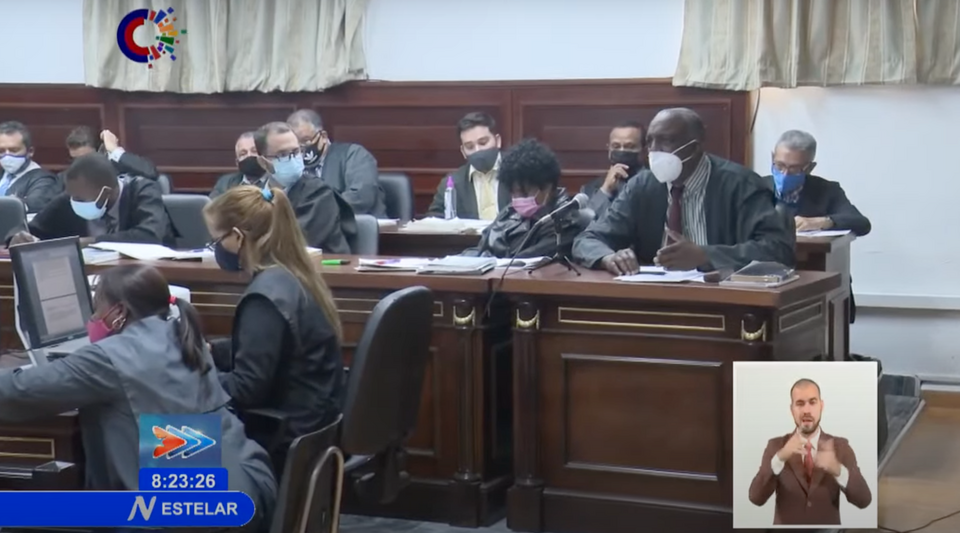The Cuban Justice sentenced this Monday for sedition 20 demonstrators who participated in the anti-government protests of last July 11 – including five minors – to between five years of limited freedom and 20 years in prison.
This ruling by the Provincial Court of Holguín is, as explained by Justice 11J activist Salomé García Bacallao, the first joint sentence for the crime of sedition issued in the country as a result of the demonstrations last July.
The 15 convicted adults, mostly men between 18 and 59 years old, have received prison sentences below the request of the prosecution. No defendant has been found not guilty.
The 15 convicted adults, mostly men between 18 and 59 years old, have received prison sentences below the request of the prosecution. No defendant has been found not guilty.
There are two sentenced to 20 years in prison, three to 18 years, two to 17, one to 15, two to 14, two to 12 and two to seven. In addition, an 18-year-old was sentenced to 5 years of “correctional labor without commitment.”
The five minors -four of 17 years and one of 16-, for whom the prosecution requested between 15 and 18 years in prison, have been sentenced to “five years of limited freedom”.
The minimum criminal age in Cuba is 16, but 16 and 17-year-olds can receive a reduction of up to half of their sentence time.
Yasmani Crespo, who was included in the file and did not appear at trial, does not appear in the sentence, according to García. There is speculation that he may have left the country.
Some activists denounced that several of those convicted were taken directly to prison after the ruling was read, despite the fact that the sentence established that they could be released on bail until the time of appeal.
14ymedio He was able to speak with Mailin Sánchez, wife of Yosvany Rosell García Caso, for whom the Prosecutor’s Office requested 30 years and who was finally sentenced to 20 years. She received the sentence this Monday, a month later.
In protest against a process that he considered unfair, García Caso was on a hunger strike in prison for 17 days, said Sánchez, who at the time reported that García Caso ended up in the infirmary due to the deterioration achieved during the protest. With him, they were planted, although fewer days, another nine prosecuted for 11J.
The Justice did not publicly disseminate these sentences and the official media have not yet reported on the ruling, although on the same day they published fragments of the trial, including witness testimonies, that have been denied in some case.
Activists and NGOs have denounced lack of guarantees, fabrication of evidence and excessive penalties in these processes around the largest anti-government protests in decades.
They have also pointed out the use of the crime of sedition in the trials of the 11J protesters, due to its political connotation and its ambiguous evidence.
They have also pointed out the use of the crime of sedition in the trials of the 11J protesters, due to its political connotation and its ambiguous evidence.
The Cuban Attorney General’s Office recently argued that it opted for charge with sedition in some cases due to “the level of violence shown in vandalism” and “in a tumultuous manner” they had the “deliberate purpose of subverting the constitutional order” and, as a result, the “serious disturbance of public order”.
Justice 11J, for its part, has considered on several occasions that the accusation of sedition is arbitrary and responds to an exemplary objective, since the events that occurred do not correspond to that alleged “disruption of the socialist order”
The Prosecutor’s Office affirms that “compliance with the constitutional rights and guarantees of due process” has been verified in the trials, despite the “manipulation” that “intends to accuse Cuba of human rights violations.”
Cuba reported the prosecution of 790 people for relevant facts related to the July 11 protests, of which 55 are between 16 and 17 years old. Another 27 are under 16 years of age, to whom alternative measures have been applied as they do not reach the minimum criminal age.
________________________
Collaborate with our work:
The team of 14ymedio is committed to doing serious journalism that reflects the reality of deep Cuba. Thank you for joining us on this long road. We invite you to continue supporting us, but this time becoming a member of our journal. Together we can continue transforming journalism in Cuba.





